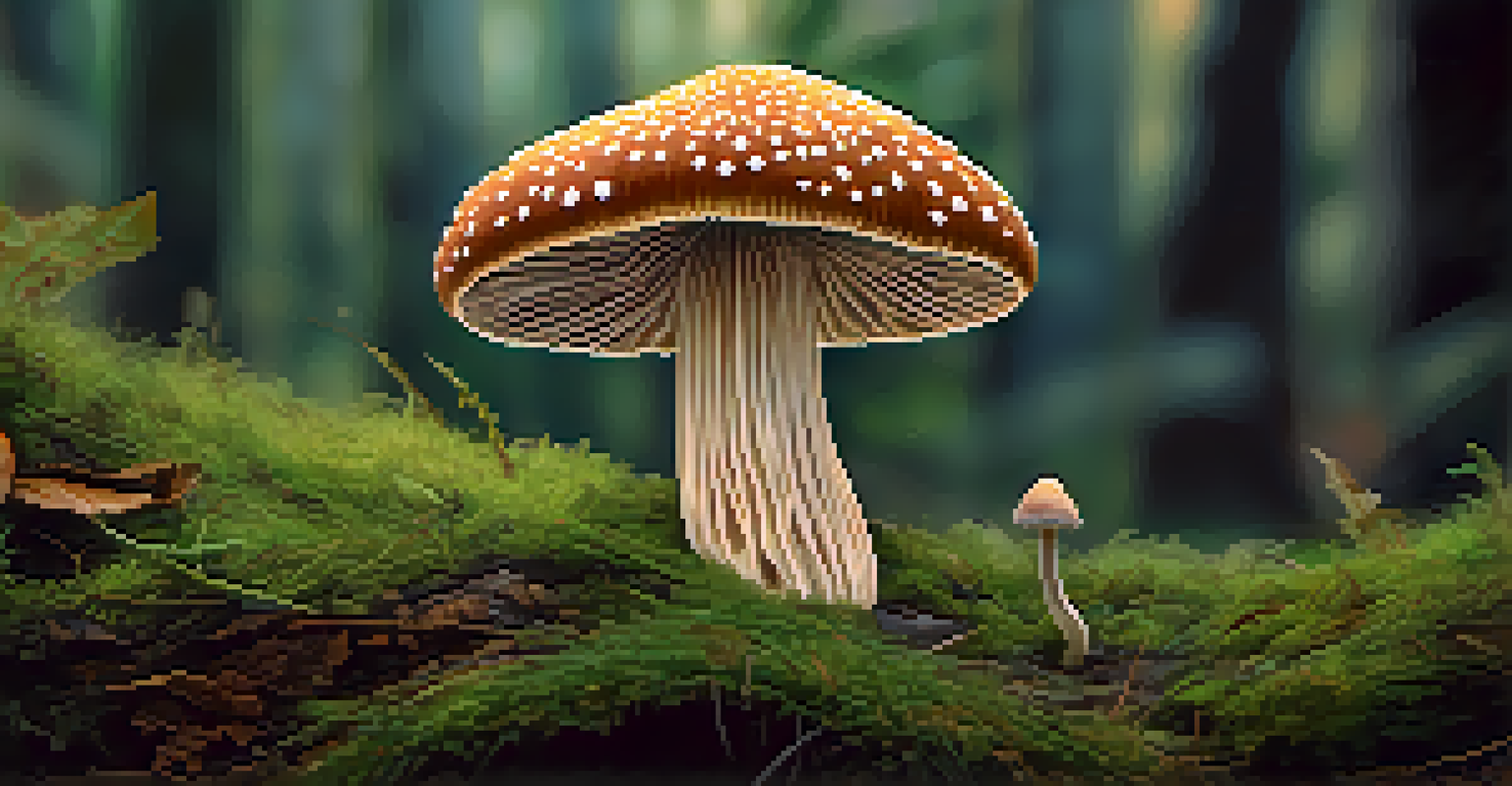Legal Status of Entheogens: A Global Overview

Understanding Entheogens: What Are They?
Entheogens are substances often used in spiritual, religious, or therapeutic contexts. They include plants and chemicals like psilocybin, ayahuasca, and peyote, which can induce altered states of consciousness. This unique ability to connect individuals with the divine or their inner selves is what makes entheogens so compelling.
The use of entheogens is an ancient practice that can help us reconnect with our spirituality and heal our inner selves.
Historically, various cultures have valued these substances for their potential to aid personal and communal growth. For instance, indigenous tribes in the Amazon have used ayahuasca for centuries in healing rituals. These practices highlight the deep-rooted relationship between humanity and these powerful natural substances.
As interest in mental health and alternative therapies grows, so does the exploration of entheogens in modern contexts. People are increasingly seeking out these substances for their potential benefits, leading to a re-examination of their legal status across the globe.
The Legal Landscape in North America
In North America, the legal status of entheogens varies significantly between countries and even states. For example, in the United States, psilocybin mushrooms remain classified as Schedule I substances; however, some states like Oregon have initiated measures for their decriminalization. This shift indicates a growing recognition of their therapeutic potential.

Canada has also seen movements toward the decriminalization of psilocybin, especially for patients with terminal illnesses. In 2020, the Canadian government granted exemptions to a limited number of patients, allowing them to use psilocybin in their end-of-life care. This progressive approach reflects a changing attitude toward the use of entheogens in medical settings.
Entheogens and Spiritual Use
Entheogens like psilocybin and ayahuasca are valued for their ability to induce altered states of consciousness, often used in spiritual and therapeutic contexts.
Despite these advancements, challenges remain. Federal laws often overshadow local initiatives, creating a complex legal web that can be confusing for those interested in exploring entheogens. Understanding these nuances is crucial for anyone looking to navigate this landscape.
Europe: A Patchwork of Regulations
Europe presents a diverse picture when it comes to the legal status of entheogens. Countries like the Netherlands have embraced a more liberal approach, allowing the sale of psilocybin truffles in 'smart shops.' This has made the Netherlands a popular destination for those seeking legal access to entheogens.
Psychedelics are not a panacea, but they are a powerful tool for personal transformation and healing.
Conversely, countries such as the United Kingdom maintain strict regulations, where psilocybin and other entheogens are classified as controlled substances. However, recent discussions around the potential therapeutic benefits of these substances are prompting some policymakers to reconsider existing laws.
The variation in legal frameworks across Europe highlights the importance of localized understanding. As some countries move towards decriminalization or therapeutic use, others may remain resistant, creating a dynamic environment for entheogen-related discussions.
South America: Roots in Tradition and Spirituality
In South America, the legal status of entheogens is often intertwined with cultural traditions. Countries like Peru and Brazil permit the use of ayahuasca for spiritual and religious ceremonies, recognizing its importance in indigenous cultures. This cultural respect contrasts sharply with other regions where entheogens face severe legal restrictions.
In Brazil, there is a formal recognition of the religious use of ayahuasca, allowing various churches to incorporate it into their practices. This legal framework not only protects cultural heritage but also promotes the responsible and respectful use of entheogens.
Legal Status Varies Globally
The legal landscape for entheogens differs greatly across regions, with some areas moving towards decriminalization while others maintain strict regulations.
However, the growing popularity of ayahuasca tourism has raised concerns about exploitation and sustainability. As interest in these substances increases, it becomes essential to balance cultural respect with responsible use to ensure their preservation for future generations.
Asia: A Region of Contrasting Views
Asia's legal stance on entheogens is notably varied, often reflecting the region's diverse cultural and religious beliefs. In countries like India, certain plants like cannabis have been used in traditional practices, yet they face strict regulation. Meanwhile, other nations, such as Thailand, are beginning to explore the therapeutic potential of substances like kratom and psilocybin.
Japan maintains a strict prohibition on many entheogens, despite a rich history of traditional plant use. The contrast between these views creates a complex landscape where cultural heritage and modern legal frameworks collide.
As awareness of entheogens grows, some Asian countries are starting to reevaluate their positions. This shift could lead to more progressive policies in the future, but it will require careful navigation of cultural sensitivities and legal challenges.
Africa: Cultural Significance and Legal Challenges
In Africa, the use of entheogens often has deep cultural significance, yet legal frameworks can be restrictive. Indigenous practices involving plants like peyote and iboga have been integral to many communities, but modern laws often overlook these traditions, leading to conflicts over their use.
Countries like South Africa have seen recent discussions around the decriminalization of certain substances, reflecting a growing recognition of their potential benefits. This shift may pave the way for a broader acceptance of entheogens in therapeutic and cultural contexts.
Future Trends in Entheogen Use
As research and public acceptance grow, many countries are reevaluating the legal status of entheogens, potentially expanding access to their therapeutic benefits.
However, these changes are often slow and met with resistance from more conservative elements within society. Balancing cultural respect with contemporary legal frameworks remains a challenge for many African nations.
The Future of Entheogens: A Global Perspective
Looking ahead, the future of entheogens appears to be on a transformative path. As research into their therapeutic benefits continues to expand, many countries are beginning to reconsider their legal status. This shift could open doors for more people to access the potential healing properties of entheogens.
Public perception is also changing, with increased awareness and acceptance of these substances in mainstream society. The dialogue surrounding mental health and alternative therapies is encouraging more individuals to explore the benefits of entheogens, further influencing legal frameworks.

Ultimately, the future of entheogens will likely be shaped by a combination of scientific research, cultural values, and public opinion. As we continue to navigate this evolving landscape, a collaborative approach will be essential in promoting both responsible use and legal reform.